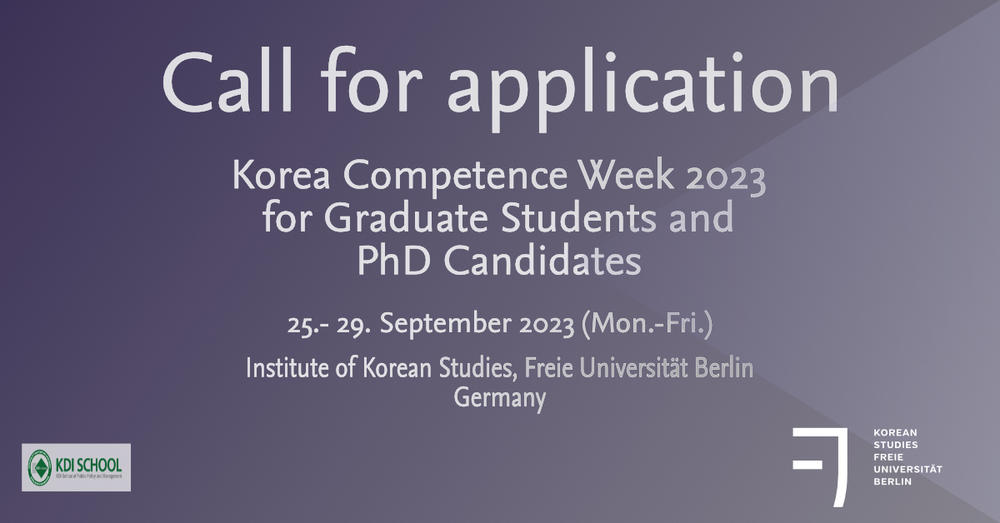The Korea-Europe Center at the Institute of Korean Studies, Freie Universität Berlin, (FU-IKS) is pleased to announce the Workshop Series <Korea Competence Week 2023> for graduate students and PhD candidates intending to enhance the academic and political competence of those involved in Korea-related research and politics.
The workshop series comprises the following four parts: (In each workshop, more experts will join as instructors.)
1. Methodology Workshop
- Monday, 25th September 2023
Instructors:
- Dr Axel Rüdiger, FU-IKS
This workshop is designed to invite Ph.D. students and scholars researching themes related to Korea to meta-analysis and self-reflection of their research. Over the course of this workshop, participants will gain greater awareness of implicit presuppositions, guiding perspectives and values, and blind spots of their own research design. This type of training will enable participants to a more conscious and reflective handling of research methods and the theoretical baggage that comes with them. It will also enhance participants intercultural competence in an increasingly globalizing academic context, and especially that of area studies.
Process of Workshop:
(1) Each participant is expected to give a presentation (20 min.) of the methodology based on the methods of his or her current research.
(2) Each presentation will be followed by a round of comments and discussion with the possibility to focus in-depth on key issues in participants research designs.
2. Publication Writing Workshop
- Tuesday, 26th September 2023
Instructors:
This workshop focuses on the dos and don’ts of academic research paper writing and publication. Participants will enhance their ability to write academic papers and how to clearly structure them, focusing on key components such as abstract writing and preparing the finished paper for submission to a journal. Participants will also learn about publication processes. With the help of an experienced journal editor, they will learn how to choose the right journal for their paper, navigate peer review, and think strategically about building visibility for their expertise.
Participants will be expected to bring a short sample of their writing, preferably a paper there are currently working on. This workshop will employ a set of peer-tutoring methods among a variety of other techniques.
3. Policy Paper Writing Workshop
- Wednesday, 27th September 2023 lecture and group work
- Thursday, 28th September 2023, morning session: group report and evaluation
Instructors:
- Mr. Kim Yonho, Associate director of George Washington Institute of Korean Studies, USA
This workshop teaches basic techniques and strategies of writing policy papers. Participants have the opportunity to gain knowledge, skills and first-hand insight from people, who are engaged in policy paper writing. The workshop intends to illuminate the context in which policy papers are produced, why they are written, and how they potentially influence decision making processes. The workshop will consist of interactive training sessions, group work and practical exercise.
4. Strategic Dialogue Workshop
- Thursday, 28th September 2023, afternoon session: lecture
- Friday, 29th September 2023 including group work and presentation
Instructors:
- Mr. Kim Yonho, Associate director of George Washington Institute of Korean Studies, USA
Strategic dialogue has been a term used with increasing frequency, both in private and public sectors. It is generally understood as denoting a processual development among groups or teams intending to reach a common understanding concerning goals, concepts or projects in view of a future. Nevertheless, what does "strategic dialogue" exactly mean? How does it differ from a regular "bilateral" or "multilateral" meeting? Is it a formal or informal process? How does it compare and contrast with 1.5 and 2-track discussions? Can academics participate in strategic dialogues, or is it a format limited to practitioners, mostly from the field of politics? Who sets the strategic agenda and how is strategic dialogue organized in practice?
The workshop will examine these and other questions providing a comprehensive overview of the instrument of strategic dialogue. The seminar will host speakers with rich experience and a proven track record in conducting such strategic dialogues with partners in Asia and, in particular, in both Koreas. The guest speakers will share their expertise and provide hands-on experiences. This workshop will also include a model-strategic dialogue in which participants will have the opportunity to prepare and simulate a strategic dialogue under the guidance of experienced practitioners in the field.
Eligibility
Applicants must be either enrolled in a Korean Studies graduate program or undertaking research on a Korea-related theme at a university in Europe.
Application period:
Until August 3rd 2023
The Korea-Europe Center will provide the selected participants with
- roundtrip train ticket (2nd class) or airfare (economy class) within Europe,
- board and lodging for the duration of the workshop
Application:
Submit the following documents in one PDF file with the applicants family name as the file name to Dr CHOE Hyondok (hyondok.choe[at]fu-berlin.de)
- Letter of Motivation
- Curriculum Vitae
- List of publications (if applicable)
- Copy of certificate of enrollment at a European university
Contact:
Dr CHOE Hyondok : hyondok.choe[at]fu-berlin.de
More Information:
- Date: 25.- 29. September 2023 (Mon.-Fri.)
- Application deadline: August 3, 2023
















